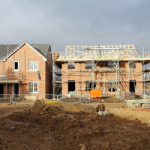Lack of Council Staff Hits Small Housebuilders
A recent survey shows that smaller developers are coming up against lack of staff and communication issues, a lack of certainty when it comes to the planning process, and a shortage of suitable development sites…
Housebuilding Concerns
A survey by the Federation of Master Builders (FMB) has revealed that the biggest concern for small housebuilders is the lack of council staff in planning departments.
Inadequate staffing of planning departments ranked highly as a cause for concern for 78% of respondents. The report states that it is the highest-ever response on this issue, revealing that the situation is getting worse.
As a planning consultant, often working with SMEs (small and medium sized enterprises) in the construction industry, Paul Smith of Apex Planning Consultants agrees that it is a problem: ‘’So many of my applications are for SMEs and they are being held up by the lack of planners to process the applications, and senior planners to sign-off the recommendations.’’
However, he says the councils are not necessarily to blame: ‘’Even the private sector struggles to find staff. It is a longstanding problem with fewer students entering and completing the planning courses available through universities and day-release opportunities through (public and private sector) employers.’’
Communication
But there is good news for those developers who fall within the Milton Keynes City Council boundaries, says Paul: ‘’I am very happy to applaud MK City Council, however, because it has created an ‘academy’ whereby it provides on-the-job training to prospective planners. This is highly progressive and a solid option for overcoming staffing problems. To a lesser extent I also found valuable experience working with different councils whilst completing a degree and post graduate degree in Town and Country Planning, therefore, providing opportunities for others is fantastic news.’’
Communication is another factor that holds up applications, according to the survey, with 60% of respondents stating it is an area of concern.
It’s another concern that Paul also comes up against. He says: ‘’There is a distinct absence of communication from councils; it is frustrating as neither the applicants nor I know the direction of a planning application. This stops the applicant from continuing behind the scenes – lining up builders, dealing with Building Regulations etc – so they are able to start on site once planning permission is granted. The failure of council planners to communicate is widespread, though I do acknowledge that this is another result of planning departments being overwhelmed and poorly resourced so they do not always have time to communicate effectively. It is my opinion that more often than not a simple phone call or email will reveal issues that need to be addressed and they can be within government targets or agreed extensions of time for the determination of planning applications. This is a more effective way of planning and decision-making, with councils and applicants engaging to deliver good and positive decisions, rather than a refusal that leads to unnecessary appeals and delays to the delivery of housing that is universally required.’’
Uncertainty
Survey respondents also find a lot of uncertainty when it comes to their prospects of getting planning permission granted – with only 11% experiencing a high degree of certainty about their prospects – quite worrying when you consider the costs related to the whole planning process and any delays.
However, it’s the availability of suitable land that is a real concern – with 62% worried about finding suitable land and 82% stating that opportunities for small site development are falling.
The report’s authors state: “FMB house builders often say they are aware of small sites, but these are not included in local plans. This is supported by the figures in this survey, as only 25% believe local authorities were taking small sites seriously.”
Paul agrees that this is the case: ‘’I truly believe there is too much focus on the allocation of strategic sites for major developments. Councils and landowners should be considering smaller pockets of land, both greenfield (undeveloped) and brownfield (developed) land and allocating them through Local Plans. There is so much development that is old and tired, and constructed to low density, that could be repurposed and or redeveloped by SMEs. This opinion is also supported by the oft-spoken mantra that we should be saving the greenfield and redeveloping brownfield sites that are more likely to be in urban locations and smaller, meaning they would suit SMEs.’’
If you would like to discuss your own project with us, or just find out more about what we do, please continue to browse the website or drop us an email to: info@apexplanning.co.uk without obligation.

